| Seite 11 |
Possessive AdjectivesPossessive adjectives identify to whom objects belong. The equivalents in English are my, your, his, her, their, our.Possessive adjectives indicate gender the same way as the indefinite articles (ein, eine) and "kein" (kein, keine).
| |||||||||||||||||||||||||
Übung 2-1e. Wie ist das Wetter? Teil A (Teil B ist auf Seite 1.) "Wie ist das Wetter in...?" Fragen Sie Ihre Partnerin / Ihren Partner! (Ask about the weather in several German cities. Fill in the information, including the temperatures. Note that temperature is considered plural, except for one degree: Es sind 16 Grad.
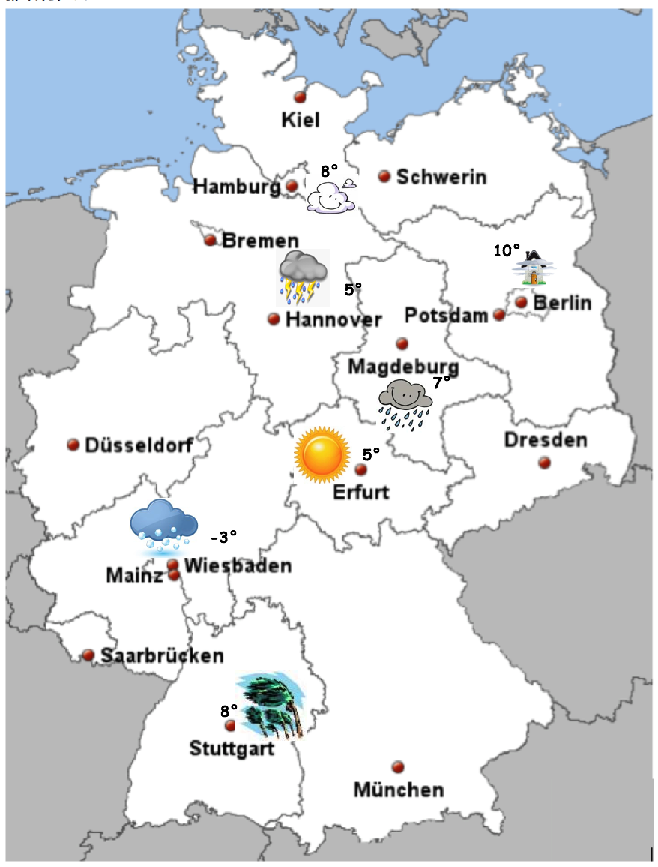
| die Stadt | das Wetter | die Temperatur |
|---|---|---|
| Düsseldorf
| ||
| Bremen
| ||
| München
| ||
| Saarbrücken
| ||
| Dresden
| ||
| Kiel
| ||
| Schwerin
|
| Es ist sonnig. Die Sonne scheint.  |
Es ist bedeckt. |
Es regnet. |
Es ist heiter. |
Es ist gewitterig.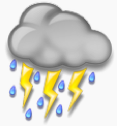 |
Es ist nebelig. |
Es schneit. |
Es ist windig. |
Es ist wolkig. |
5° Es sind fünf Grad. -4° |
Übung 2-2b: Städte und Entfernungen Teil B (Teil A ist auf Seite 2) In the last section on weather, a number of cities in Germany were identified. This exercise reviews numbers and introduces a number of other German cities and their locations. Use the distance table (Entfernungstabelle) to ask the distances between the cities. Draw a line or arrow between the cities and label the distance, as in the example (see map). Fill in the table with the distances.
Beispiel:
- Wie weit ist es von Rostock nach Frankfurt am Main? (How far is it from Rostock to Frankfurt am Main?)
- Von Rostock nach Frankfurt am Main sind siebenhundert fünfzig Kilometer.
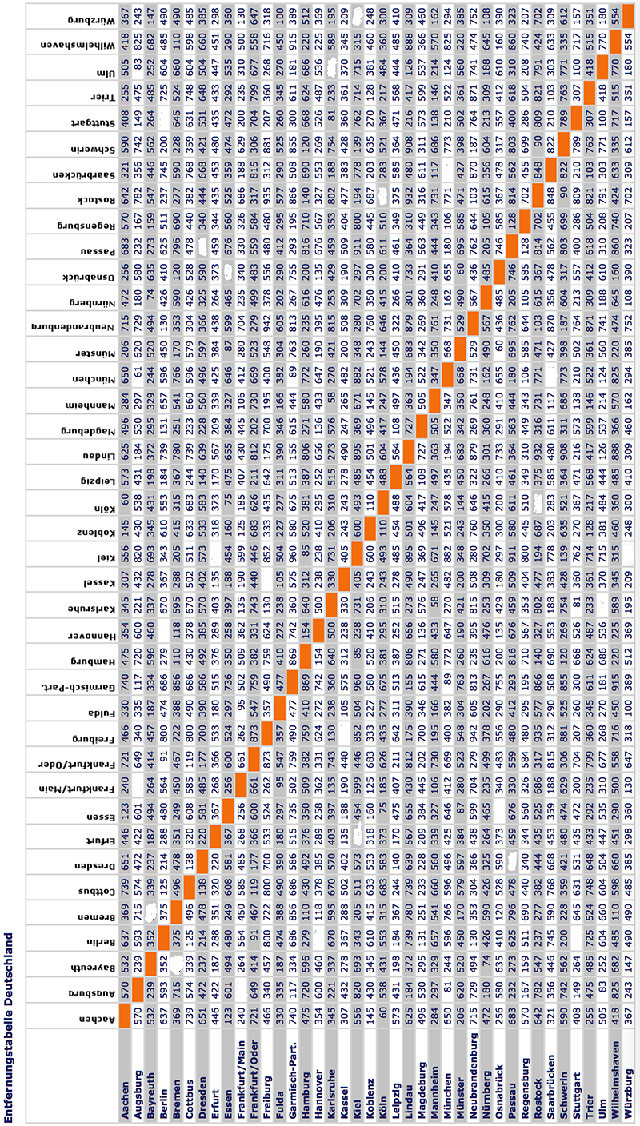
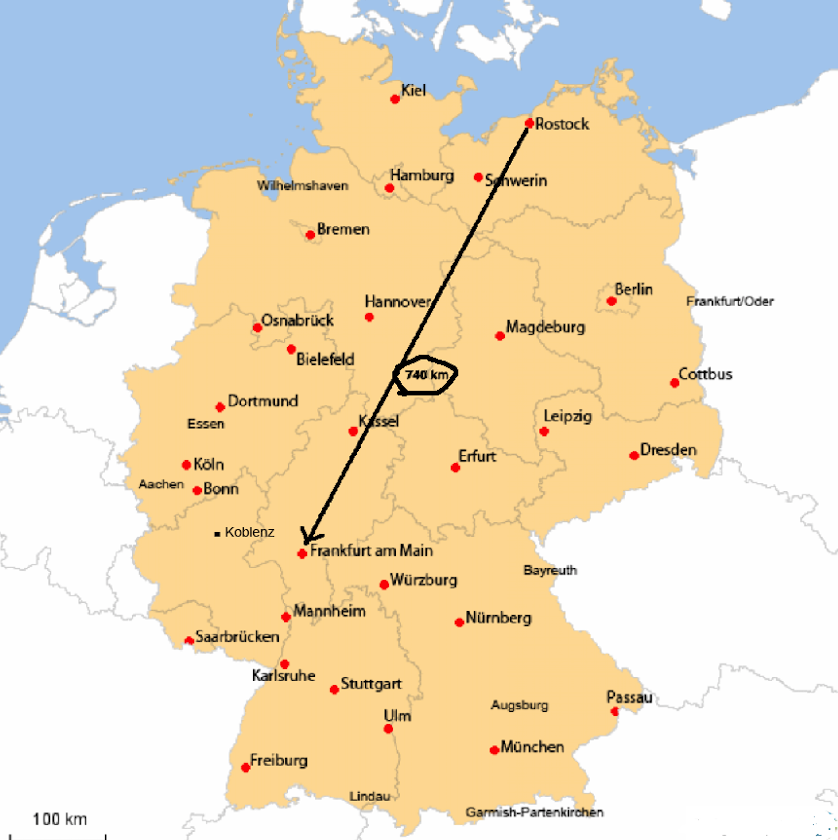
| Km | Km | ||
| Km | Km | ||
| Km | Km | ||
| Km | Km | ||
| Km | Km | ||
| Km | Km |
Übung 2-3c: Quantitäten erfragen und nennen. Teil B (Teil A ist auf Seite 3.) Fragen Sie Ihren Partner/Ihre Partnerin nach den restlichen Informationen! (Ask your partner for the missing information.) Berichten Sie!
Redemittel:
- Frage: (question) Wie viele Zimmer hat die Wohnung von Herrn Fischer?
- Antwort: (answer) Die Wohnung von Herrn Fischer hat vier Zimmer.
- Frage: Wie viele Zimmer hat deine Wohnung?
- Antwort: Meine Wohnung hat ein Zimmer.
Bilder (das Bild)
|
Stühle (der Stuhl)
|
Tische (der Tisch)
|
Betten (das Bett)
|
Fenster (das Fenster)
|
Regale (das Regal)
|
Toiletten (die Toilette)
|
Sofas (das Sofa)
|
Türen (die Tür)
|
Lampen (die Lampe)
|
Pflanzen (die Pflanze)
|
Schränke (der Schrank)
|
Radios (das Radio)
|
Teppiche (der Teppich)
|
Zimmer (das Zimmer)
|
|
|---|---|---|---|---|---|---|---|---|---|---|---|---|---|---|---|
| die Wohnung von Herrn Fischer | 3 | 8 | 1 | 2 | 2 | 3 | 4 | ||||||||
| die Wohnung von Frau Kleist | 2 | 2 | 12 | 1 | 2 | 4 | 1 | 5 | |||||||
| meine Wohnung | |||||||||||||||
| die Wohnung von meiner Partnerin / meinem Partner |
Übung 2-3d Städte lokalisieren. Teil B (Teil A ist auf Seite 3.) You describe in German where selected German cities are located. This is a two-step process:
- For each city, state in which compass location the city is located by using the German words for north, northwest, west, etc. For example, the city of Trier is in the west. You use the German verb liegen to say that Trier is located in the west: "Trier liegt im Westen." The compass directions are easy to remember, because they are close to the English words.
- For a precise location, you state that the city is north of (nördlich von...), south of (südlich von...), west of (westlich von...), etc. of another city. For example: "Trier liegt südlich von Aachen und westlich von Worms." (Trier is located south of Aachen and west of Worms.)
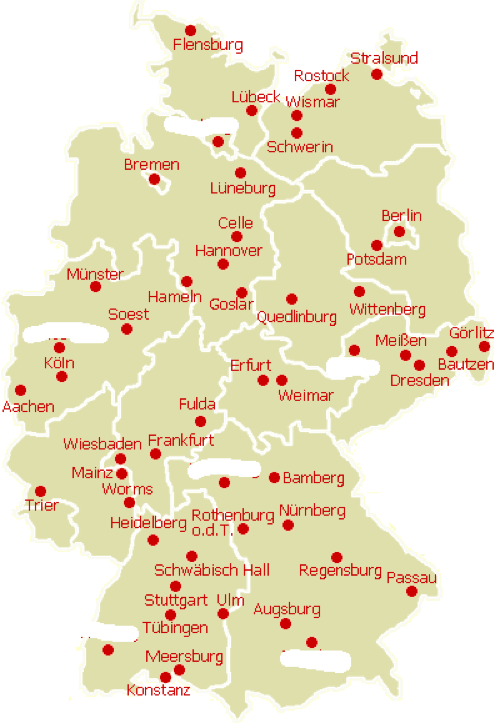 |
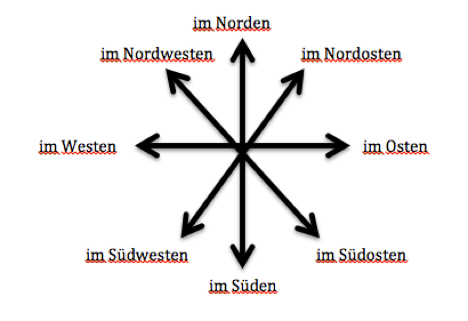 |
Fragen Sie Ihre Partnerin / Ihren Partner, wo die folgenden Städte liegen:
Schreiben Sie die Namen der Städte auf die Landkarte! | |
Redemittel:
| |
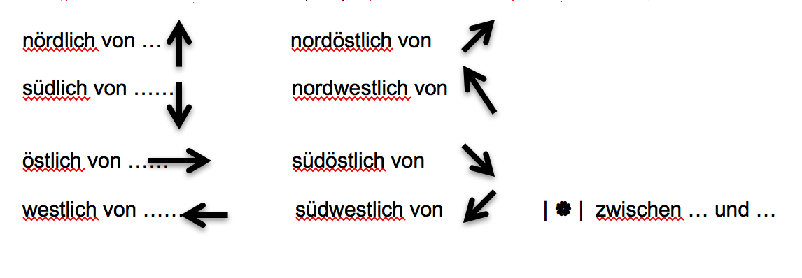 | |
Übung 2-5b: Wie ist das Wetter in Europa? Teil B (Teil A ist auf Seite 5.) Ask your partner for the weather information for cities marked A. Your partner will ask for the weather information for the cities marked B. Fill in the information for all the cities, both A and B. Beispiel: Wie ist das Wetter in Madrid? → Es ist wolkig in Madrid. Wie ist die Temperatur in Madrid? → Es sind dreizehn Grad in Madrid.
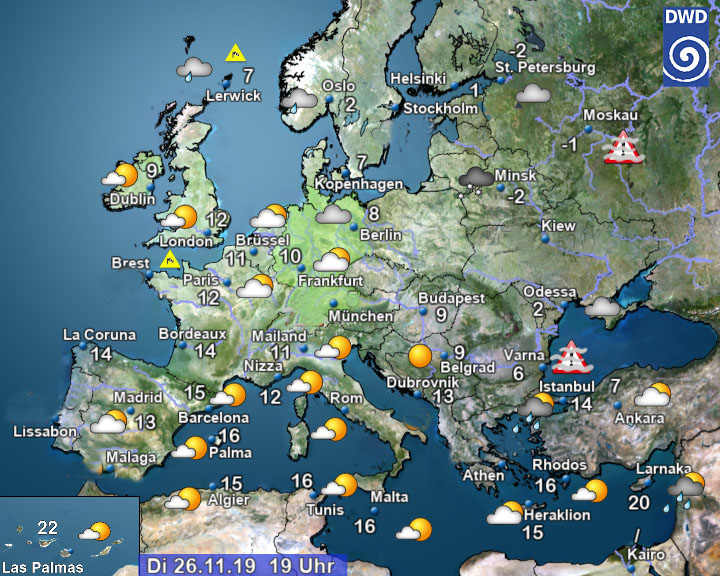
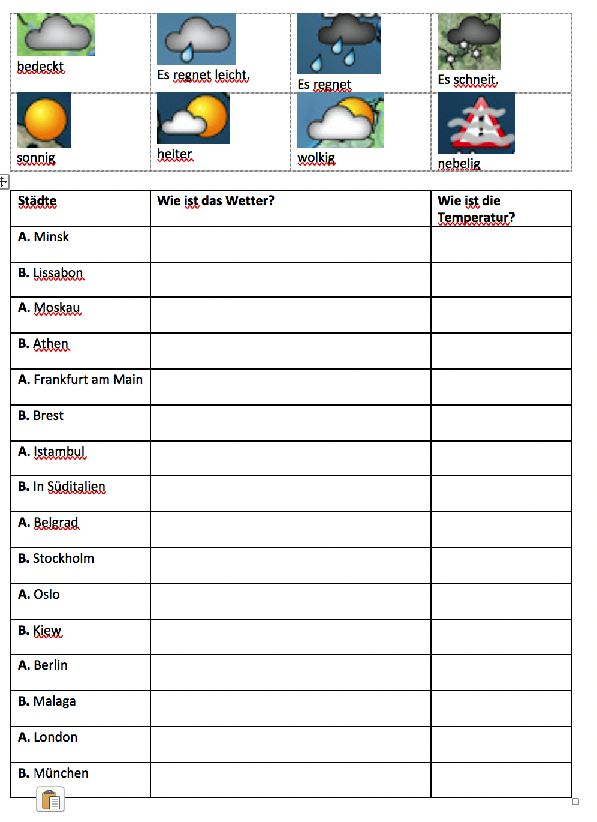
Übung 2-6c: Haben und nicht haben Teil B: Partnerarbeit. (Teil A ist auf Seite 6.)
| kein = not, not any, none, no
|
-- = nein |  |
 | ||
| Sie | Meine Partnerin Mein Partner | ||||
 |
Geschwister (pl) (siblings) | ||||
 |
Zeit (f) (time) | ||||
 |
Hunger (m) (hunger) | ||||
 |
Durst (m) (thirst) | ||||
 |
Arbeit (f) (work) | ||||
 |
Geld (n) (money) | ||||
 |
ein Sofa (n) | ||||
 |
ein Handy (n) |
Fragen Sie Ihre Partnerin! Fragen Sie Ihren Partner!
Beispiel:
- A: Hat Pedro Arbeit? B: Ja, Pedro hat Arbeit. (Nein, Pedro hat keine Arbeit.)
- A: Hat Carmen ein Handy B: Ja, Carmen hat ein Handy. (Nein, Carmen hat kein Handy.)
- A: Hat Pedro Durst. B: Ja, Pedro hat Durst. (Nein, Pedro hat keinen Durst.)
- A: Hast du Geschwister? B: Ja, ich habe Geschwister. (Nein, ich habe keine Geschwister.)
Dann erzählen Sie: "Pedro hat Arbeit. Carmen hat keinen Durst. Ich habe keine Zeit. Meine Partnerin hat kein Geld."
Checklist for the Test, Kapitel 2, Writing Section
Checklist for the Test, Kapitel 2, Speaking SectionSpeaking sections will be allowed five minutes one-on-one with the instructor. For those who prepared well, it should only take a minute. You must sign up for a time on the signup sheet. You must be punctual, because others will be in line. If you have a class during those times, then you may schedule an appointment for a different time. You will need to express all of the following in German.
|
- Kapitel 2: Seite 1
- Kapitel 2: Seite 2
- Kapitel 2: Seite 3
- Kapitel 2: Seite 4
- Kapitel 2: Seite 5
- Kapitel 2: Seite 6
- Kapitel 2: Seite 7
- Kapitel 2: Seite 8
- Kapitel 2: Seite 9
- Kapitel 2: Seite 10
- Kapitel 2: Seite 11